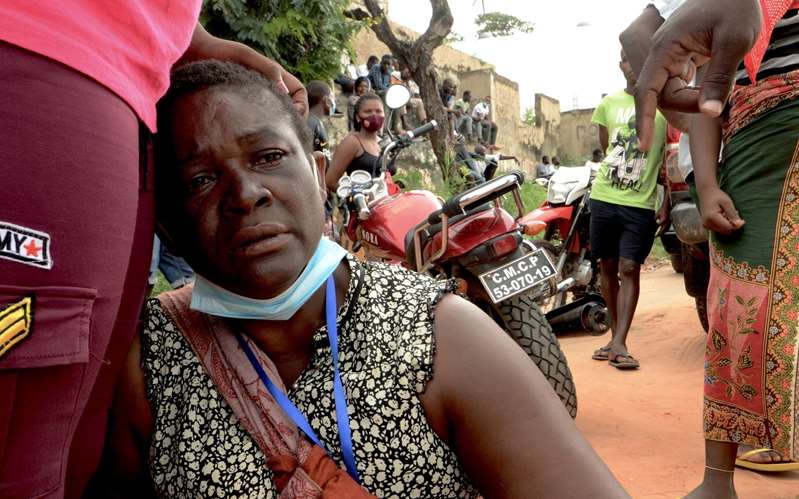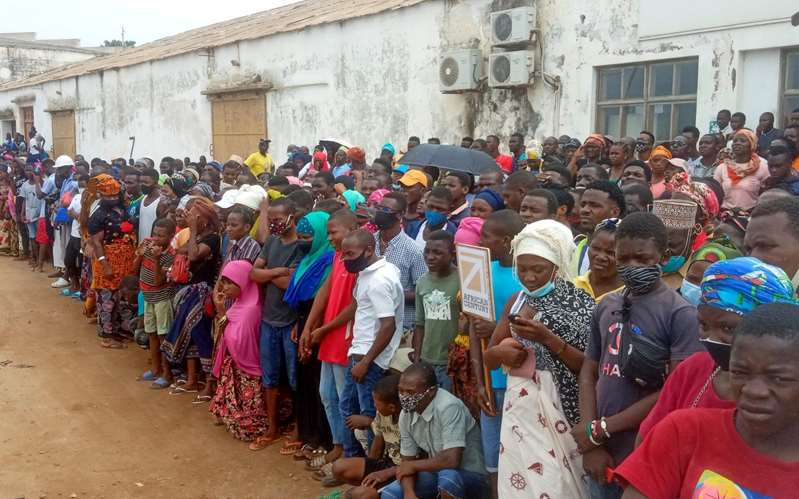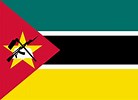Mass beheadings and vast untapped wealth: Inside the mysterious Islamist insurgency sweeping Mozambique
Mass beheadings and vast untapped wealth: Inside the mysterious Islamist insurgency sweeping Mozambique
It was the stuff of nightmares. Hundreds of heavily armed terrorists take over an entire town, law and order collapses, and civilians are left to fend for themselves as masked psychopaths slaughter with impunity.
Last week’s assault on the Mozambican town of Palma shocked the world. But Mozambique’s insurgency has been growing in power and violence for nearly four years - to the horror of those charged with combating it.
“These guys are different. What they do to the people they capture and kill I have never seen anywhere in Africa, and I have been in a lot of places in Africa,” said Lionel Dyck, the Zimbabwean mercenary whose private security firm was hired by the Mozambican government last year.
“When you mutilate people after you kill them, you cut their bodies in half, you skin them, you cut their heads off and then you cut their limbs off…the brutality is unbelievable,” he said.
Col Dyck, a gimlet-eyed former Rhodesian army officer who has been in and out of wars in Africa since the 1970s, is not a man given to hyperbole.
His remarks match exactly with videos of the aftermath of recent attacks in Cabo Delgado viewed by The Telegraph.

Who are the people wreaking such terror? And what do they want?
The insurgents in Mozambique’s remote Cabo Delgado province are often referred to simply as “mysterious". ”More ambitious descriptions are “Islamist” or “Islamic State linked”.
But the internal mechanics of the group is opaque.
When the United States designated the movement as a terrorist organisation on March 10, it could only name only one individual as a known member: Abu Yasir Hassan, a Tanzanian cleric thought to lead it.
The truth is, the uprising in Mozambique is not just unlike almost any other African guerrilla war Col Dyck has seen. It is also unlike most other Islamist insurgencies Western militaries have grown accustomed to fighting.
The insurgency in Cabo Delgado is usually dated to 5 October 2017, when 30 youths armed with machetes descended on the police station in the coastal town of Mocimboa da Praia, slaughtered the occupants, and urged the locals to follow sharia law.
But academic researchers believe the movement began at least ten years earlier, with the emergence of an enigmatic sect that clashed with both the established local Sufis and the Gulf-funded Wahabbi Muslim leaders in the area.
Eric Morier-Genoud of Queen’s University Belfast has traced the origins of the sect to a preacher called Sualehe Rafayel, who in 2007 returned home to Cabo Delgado after several years in neighbouring Tanzania.
The group he founded set up mosques across the Cabo Delgado region and gained a reputation for rejecting the secular state, encouraging members to keep children out of school, and following unorthodox religious practices like keeping shoes on inside the mosque.

Some observers believe the group was linked to followers of Aboud Rogo Mohammed, a radical Kenyan cleric who was killed in mysterious circumstances in 2012. For a while, they seemed content to withdraw from what they viewed as an impious society rather than confront it.
But over the next several years, tensions with both established Muslim leaders and the state grew following clumsy attempts to repress the sect.
In 2016, followers of the group, known to locals as Al Sunnah wa Jama’ah (people of the Sunnah community) or Al Shabaab (“the youth”, no relation to the Somali militant group of the same name) clashed with police during a protest against the sale of alcohol.
Around the same time, it is thought to have extended its access to man power, money and weapons by allying with artisanal miners, illicit traders and organised crime groups who were forced out of business by their controversial eviction from a rich ruby field to make way for a legal mine.
It is that canny exploitation of local economic grievances and existing corruption that is thought to have allowed the terrorists to rapidly expand since their turn to open violence in 2017.
Since then, they have steadily expanded their arsenal of weapons through successful raids on Mozambican police and military units. They recently began using RPGs and mortars, to the surprise of Col Dyck’s mercenaries.
The insurgents have also expanded their international links and become markedly more professional soldiers. In 2019, a force of Russian mercenaries from the Wagner group quit the country after suffering deadly ambushes.
There is evidence that some members have been trained in eastern Congo or even Somalia. Col Dyck says he has intelligence about South African extremists, some with military experience, who have travelled to join the group. In 2019, it declared allegiance to Islamic State.
That does not mean the outfit has a great deal of popular support however.
About a 700,000 people have been internally displaced by the conflict as they seek refuge from the barbarity of the insurgents. As the countryside empties, food insecurity has surged; army-escorted supply convoys have come under attack; and a shortage of potable water has fuelled a cholera outbreak.
Last month Amnesty International accused the insurgents, the Mozambican government, and the Dyck Advisory Group of war crimes. DAG strongly denies the allegations and says it is considering legal action.
“Ninety percent of them are probably local recruits, around a very small hard core of real committed Islamists,” said Alex Vines, the head of the Africa program at Chatham House and a veteran Mozambique watcher.
“Why was Palma a target? There are not many rich targets left, and loot and food and redistribution of goodies is important because I am sure religion is not the primary motivation for many of their fighters,” he added. That is especially important when you have alienated so many locals, he added.
Nor should its power be exaggerated. There is no evidence of links with Islamic State's core movement in Syria and Iraq, and unlike Daesh ASJW has not declared jihad on the international order or specifically targeted foreigners. The black banner of IS is most likely a "flag of convenience" meant to intimidate enemies.
Their area of operations is also isolated from other Islamist uprisings in Somalia or the Sahel, and a clampdown last year by Tanzanian security forces has impacted its ability to use that country as a rear area.
And since Col Dyck’s small force of 18 veteran helicopter-borne mercenaries deployed a year ago, the militants have been pushed back from threatening the provincial capital of Pemba.
So what is to be done?
A week and a half after the initial assault on Palma, the area is still not fully secured. Total has been forced to halt construction of its multi-billion dollar gas development project, and thousands of refugees have streamed into Pemba or across the border into Tanzania.
“The solutions are developmental. It is about dialogue so you have to accept that some of these insurgents you have to talk to. Peel away the support and get past the hardcore,” said Mr Vines.
Steps have been taken in that direction. Mozambique president Filipe Nyusi in February offered amnesty to Islamist insurgents who surrender.
Col Dyck, whose helicopters flew their last combat mission on Friday as their contract ended, believes his tiny force is being cut loose prematurely.
The Mozambican army has improved, he says, but not yet enough to smoothly take over air support operations when his eighteen veterans head back to South Africa early next week.
But fighting is itself only a sticking plaster. Like Mr Vines, he predicts the war will end with talking.
“It will go on. Most insurgencies, if you look at history, take 15 years from start to finish, and after 15 years guess who is in the chair?” said Col Dyck, shortly before he took off to command his group’s last combat mission.
“So right now there has to be a solution to suppress the dissidents. And at the same time there has got to be a concurrent civic effort to reestablish law and order and get the population back on side.
“The locals have been bullied by all kinds of people. So I think you need a concerted effort to clear an area, control it, and put in schools, hospitals, police stations, all those things you need. And hold them - don’t just put them there and desert them.”
French oil company withdraws
Africa's largest liquified natural gas project faces uncertainty after Total pulled all staff out of its Mozambique site in the aftermath of a devastating terrorist attack.
The French oil giant previously said that it would mothball its Afungi peninsula site in Cabo Delgado but keep a skeleton crew in place to maintain security after last week's attack on the town of Palma, six miles away.
It now appears the company has decided to fully withdraw all staff, leaving the site entirely in the hands of Mozambican government forces.
Total has not said it is abandoning the project and has previously said it remains committed to its contract to develop the offshore gas field.
The move will be seen as a major propaganda victory for the Islamist insurgency in Cabo Delgado, which has killed at least 2500 people in a bloody campaign against the Mozambican government since 2017.
Witnesses told the Telegraph that the evacuation by air and sea was completed by Friday afternoon, with contractors and staff abandoning vehicles, equipment and buildings.
The Mozambique LNG Project started with the discovery of a vast quantity of natural gas off the coast of northern Mozambique in 2010.
Total bought out the American firm Anadarko's stake in the project with a $20 billion Final Investment Decision in 2019. It is meant to start delivering LNG in 2024.
The British government's foreign credit agency, the uK Export Finance (UKEF), is offering loans worth $300 million to British company working on the gas project and will also guarantee loans from commercial banks worth up to $850 million.
Total previously paused work and partially evacuated staff in response to the security threat in January.
The company did not immediately respond to requests to comment.
Roland Oliphant, Peta Thornycroft
Articles-Popular
- Main
- Contact Us
- Planetary Existences-2
- Planetary Existences
- TWO REVELATIONS-2
- The Two Revelations
- Jeffery Epstein - The Saga - 9
- Jeffery Epstein - The Saga - 8
- Jeffery Epstein - The Saga - 10
- Universality of Initiation
- The Participants In The Mysteries-2
- The Path Of Initiation
- Initiation and the Devas
- The Fourth Way - Study of Oneself - P.D.Ouspensky
- Impeachment Investigators Subpoena White House - Ukraine
- Discipleship - Group Relations - 2
- The Probationary Path - 2
- The Final Initiation
- The Succeeding Two Initiations
- The Participants In The Mysteries
- Discipleship - Group Relationships
- Discipleship
- Jeffery Epstein - The Saga - 7
- The Fourth Way - Wrong Functions - P.D Ouspensky
- Statues are a mark of honour. Like Edward Colston, Cecil Rhodes and Oliver Cromwell have to go
- Jeffery Epstein - The Saga - 6
Articles - Latest
- Russian spy expelled from Britain under crackdown as Vladimir Putin told to stop 'malign activity'
- John Swinney to become Scottish first minister after vote by MSPs
- Russia threatens to strike UK military sites amid rising tensions over Ukraine
- Nigel Farage drops huge election hint - and Rishi Sunak will be happy
- China's president arrives in Europe to reinvigorate ties at a time of global tensions
- Russia issues WW3 'retaliation' warning to London over Crimea Bridge
- The Tory big beasts tipped to lose their seats
- Andy Burnham makes cheeky request to people of Manchester as he’s re-elected mayor
- The unexpected announcement of a prime minister divides Haiti's newly created transitional council
- Blinken to Hamas: Accept Israel's 'extraordinarily generous' Gaza truce proposal
- 'Loan shark', 83, ordered to pay back over £173,000
- Thai court adds jail time for rights lawyer who urged monarchy reform
- Rapist jailed a decade after campaign of abuse against London woman
- Former SNP council leader appears in court charged with sexual offences
- Former mayor of Winchester smothered elderly mother with cushion, court told






